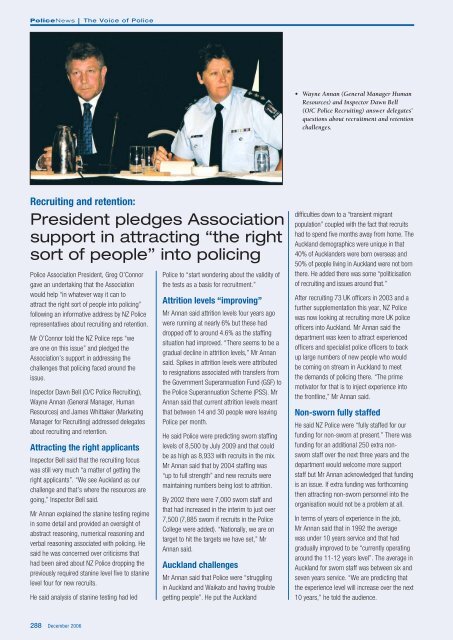<strong>Police</strong><strong>New</strong>s<strong>The</strong> Voice of <strong>Police</strong>• Wayne Annan (General Manager HumanResources) and Inspector Dawn Bell(O/C <strong>Police</strong> Recruiting) answer delegates’questions about recruitment and retentionchallenges.Recruiting and retention:President pledges <strong>Association</strong>support in attracting “the rightsort of people” into policing<strong>Police</strong> <strong>Association</strong> President, Greg O’Connorgave an undertaking that the <strong>Association</strong>would help “in whatever way it can toattract the right sort of people into policing”following an informative address by NZ <strong>Police</strong>representatives about recruiting and retention.Mr O’Connor told the NZ <strong>Police</strong> reps “weare one on this issue” and pledged the<strong>Association</strong>’s support in addressing thechallenges that policing faced around theissue.Inspector Dawn Bell (O/C <strong>Police</strong> Recruiting),Wayne Annan (General Manager, HumanResources) and James Whittaker (MarketingManager for Recruiting) addressed delegatesabout recruiting and retention.Attracting the right applicantsInspector Bell said that the recruiting focuswas still very much “a matter of getting theright applicants”. “We see Auckland as ourchallenge and that’s where the resources aregoing,” Inspector Bell said.Mr Annan explained the stanine testing regimein some detail and provided an oversight ofabstract reasoning, numerical reasoning andverbal reasoning associated with policing. Hesaid he was concerned over criticisms thathad been aired about NZ <strong>Police</strong> dropping thepreviously required stanine level five to staninelevel four for new recruits.He said analysis of stanine testing had led<strong>Police</strong> to “start wondering about the validity ofthe tests as a basis for recruitment.”Attrition levels “improving”Mr Annan said attrition levels four years agowere running at nearly 6% but these haddropped off to around 4.6% as the staffingsituation had improved. “<strong>The</strong>re seems to be agradual decline in attrition levels,” Mr Annansaid. Spikes in attrition levels were attributedto resignations associated with transfers fromthe Government Superannuation Fund (GSF) tothe <strong>Police</strong> Superannuation Scheme (PSS). MrAnnan said that current attrition levels meantthat between 14 and 30 people were leaving<strong>Police</strong> per month.He said <strong>Police</strong> were predicting sworn staffinglevels of 8,500 by July 2009 and that couldbe as high as 8,933 with recruits in the mix.Mr Annan said that by 2004 staffing was“up to full strength” and new recruits weremaintaining numbers being lost to attrition.By 2002 there were 7,000 sworn staff andthat had increased in the interim to just over7,500 (7,885 sworn if recruits in the <strong>Police</strong>College were added). “Nationally, we are ontarget to hit the targets we have set,” MrAnnan said.Auckland challengesMr Annan said that <strong>Police</strong> were “strugglingin Auckland and Waikato and having troublegetting people”. He put the Aucklanddifficulties down to a “transient migrantpopulation” coupled with the fact that recruitshad to spend five months away from home. <strong>The</strong>Auckland demographics were unique in that40% of Aucklanders were born overseas and50% of people living in Auckland were not bornthere. He added there was some “politicisationof recruiting and issues around that.”After recruiting 73 UK officers in 2003 and afurther supplementation this year, NZ <strong>Police</strong>was now looking at recruiting more UK policeofficers into Auckland. Mr Annan said thedepartment was keen to attract experiencedofficers and specialist police officers to backup large numbers of new people who wouldbe coming on stream in Auckland to meetthe demands of policing there. “<strong>The</strong> primemotivator for that is to inject experience intothe frontline,” Mr Annan said.Non-sworn fully staffedHe said NZ <strong>Police</strong> were “fully staffed for ourfunding for non-sworn at present.” <strong>The</strong>re wasfunding for an additional 250 extra nonswornstaff over the next three years and thedepartment would welcome more supportstaff but Mr Annan acknowledged that fundingis an issue. If extra funding was forthcomingthen attracting non-sworn personnel into theorganisation would not be a problem at all.In terms of years of experience in the job,Mr Annan said that in 1992 the averagewas under 10 years service and that hadgradually improved to be “currently operatingaround the 11-12 years level”. <strong>The</strong> average inAuckland for sworn staff was between six andseven years service. “We are predicting thatthe experience level will increase over the next10 years,” he told the audience.288December 2006
‘Better work stories’ campaignMr Whittaker outlined a recruitment strategyallied to an advertising campaign, whichwas recently launched across various mediaforums. <strong>The</strong> “better work stories” advertisingcampaign had seen the launch of a newwebsite and ongoing initiatives being lookedat were advertising at key events such asexpos and the possible implementation of aninteractive game to attract young applicants.Utilisation of Pacific Island networks and theuse of other media would also be part of thecampaign with a pilot zone being establishedin Auckland.<strong>New</strong> <strong>Zealand</strong> <strong>Police</strong> <strong>Association</strong><strong>The</strong> advertising campaign focuses on policingbeing an interesting and varied role with anemphasis on recruits being able to look forwardto having a job with meaning and a sense ofchallenge. To this end, the advertising wouldhighlight situations that police officers mightcommonly find themselves in.Recruitment and retention; aglobal challenge for <strong>Police</strong>Recruitment and retention is a major issuefacing policing globally and an address by<strong>Police</strong> <strong>Association</strong> Research/Policy Advisor,Peter Agnew, gave delegates an overview ofthe common challenges many departmentsface.<strong>The</strong>re were common themes, as emphasisedin a variety of studies, not the least of whichwas the report of <strong>The</strong> Australian Centre forPolicing Research (West Australia), whichsuggested that policing was facing a twinproblem of an ageing population on the onehand coupled with a decline in the youngerpopulation on the other.<strong>Police</strong> numbers in <strong>New</strong> South Wales are belowthe required standard and 3,000 new policeofficers are required over the next three years.In NSW attrition rates are running between50 and 80 per month and this was despite amassive recruitment drive.In July 2004 South Australia took a leafout of the NZ <strong>Police</strong> book and recruited 81UK recruits and then added a further 85former police officers in March last year.“<strong>Police</strong> had exhausted the local market andmany applicants had proved unsuitableor unemployable,” Mr Agnew said. SouthAustralian <strong>Police</strong> had been reluctant to droprecruitment standards just to fill places.Rally in Townsville<strong>The</strong> shortage of officers had prompted a rallyin Townsville, Queensland, in order to try andfill 34 current police vacancies and in remoteparts of rural Queensland there was significantunderstaffing.Against this background were allegations thatthe <strong>Police</strong> Academy had rehired previouslyfailed applicants and allowed them to continueworking for <strong>Police</strong>.Mr Agnew said that the terrorism attacks of9/11 had increased competition from otheragencies such as Customs and the ArmedForces in the Northern Territory leadingCommissioner White to try and make <strong>Police</strong>the “employer of choice” by endeavouring tomaintain competitive salaries, technologicaladvances and conditions in order to retainexisting officers.‘Recruitment cannibalism’In the USA there is intense competition– known as ‘recruitment cannibalism’–between various competing departmentsdealing with a shrinking pool of applicants. ByJune of this year 80% (13,600) of the 17,000law enforcement agencies had positions theycould not fill.As a result, bidding wars between variousagencies have escalated to the stagewhere Houston, which has 1200 vacancies,recently lured 53 deputies from the Sheriff’sDepartment by paying a $7,000 signingbonus, offering a $12,000 rise in pay and a12-week modified <strong>Police</strong> Academy course.San Diego followed suit with a $5,000 signingbonus for experienced officers.San Antonio needs 500 extra police officers,Dallas needs 800, <strong>New</strong> York has 3,300vacancies and California has a massive8,500 vacancies. Just five years ago the 39<strong>Police</strong> academies in California were turningout 4,500 new police officers annually. Thisyear fewer than 300 new police officerswill graduate. <strong>The</strong> situation is pretty direin Los Angeles with the LAPD boosting itsrecruitment team from two to 12 staff, with a$1,000 cash reward/bounty paid to any officerwho brings in a new recruit.Advertising campaignLas Vegas has adopted an advertisingcampaign aimed specifically at 18 to 25-year-olds by using cartoons because it iscompeting with the military, which pitches itsrecruitment drive through similar initiativessuch as interactive games on its websites.Chicago used to have a waiting list of applicantsand now it scrambles to keep recruits.Across the border inCanada, a Canadian<strong>Police</strong> Sector Councilstudy recently • Peter Agnewrevealed “recruitmentand retention as priority number one” due todwindling applicant pools. <strong>Police</strong> agencieshave begun to mirror the American situationwith cities and provinces poaching officersfrom neighbouring jurisdictions.<strong>The</strong> famed Royal Canadian Mounted <strong>Police</strong>have indicated huge concern about what itterms “the greying of the red serge”. Withthousands of officers due to retire, the RCMPfaces the uphill task of recruiting 6,000additional officers in the next three years inorder to replace them. Demand for policeofficers is at its highest level since 1981.UK situationConversely, the United Kingdom is not facingserious recruitment problems. In fact, with138,000 officers, UK forces now have thehighest number of police officers sincerecords began in 1921. <strong>The</strong>re is a backlogof willing recruits in Northern Ireland but, inan almost mirror image of recent concernsin <strong>New</strong> <strong>Zealand</strong>, the <strong>Police</strong> Federation ofEngland and Wales predicts a future problemin the Criminal Investigation Department (CID)because of what it sees as a “lack of focus”on retaining detectives. Ethnic minorities arealso under represented in the UK. NZ <strong>Police</strong>has been making a concerted effort to addressthis issue to reflect population increases.Mr Agnew said that ageing populations, ababy boomer generation nearing retirement,and a diminishing number of younger peoplewho cannot meet the physical or healthstandards that policing demands, werecoming together into a mix “which wouldsignificantly challenge police forces aroundthe world” in terms of their future recruitmentand retention challenges.December 2006289

















